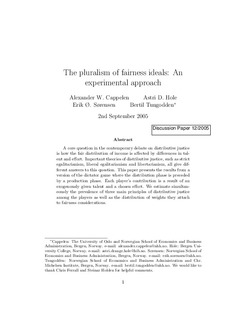| dc.contributor.author | Cappelen, Alexander W. | |
| dc.contributor.author | Hole, Astri Drange | |
| dc.contributor.author | Sørensen, Erik Ø. | |
| dc.contributor.author | Tungodden, Bertil | |
| dc.date.accessioned | 2006-07-10T11:34:40Z | |
| dc.date.available | 2006-07-10T11:34:40Z | |
| dc.date.issued | 2005-09 | |
| dc.identifier.issn | 0804-6824 | |
| dc.identifier.uri | http://hdl.handle.net/11250/162698 | |
| dc.description.abstract | A core question in the contemporary debate on distributive justice
is how the fair distribution of income is affected by differences in talent
and effort. Important theories of distributive justice, such as strict
egalitarianism, liberal egalitarianism and libertarianism, all give different
answers to this question. This paper presents the results from a
version of the dictator game where the distribution phase is preceded
by a production phase. Each player’s contribution is a result of an
exogenously given talent and a chosen effort. We estimate simultaneously
the prevalence of three main principles of distributive justice
among the players as well as the distribution of weights they attach to fairness considerations. | en |
| dc.format.extent | 305179 bytes | |
| dc.format.mimetype | application/pdf | |
| dc.language.iso | eng | en |
| dc.publisher | Norwegian School of Economics and Business Administration. Department of Economics | en |
| dc.relation.ispartofseries | Discussion paper | en |
| dc.relation.ispartofseries | 2005:12 | en |
| dc.title | The pluralism of fairness ideals : an experimental approach | en |
| dc.type | Working paper | en |
